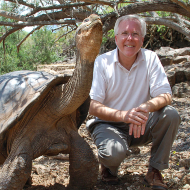There are many well-founded reasons why students must learn about evolution, but my response is limited to three.
First, evolution as "organic change through time" allows species which otherwise might appear as separate unrelated threads to be woven together into the incredible fabric of life. Without the foundation provided by evolution, biology is little more than natural history, with no natural explanation as to why birds and dinosaurs are much more closely related than hedgehogs and pineapples. The principle of evolution both provides a picture of lineages of relationships and offers the mechanism for how change through time occurred and continues to this day.
A second major reason why evolution is worth teaching is that it can neatly exemplify an important aspect of how science works. Specifically, by addressing evolution properly, teachers can demonstrate the silliness of the dismissive expression "evolution is just a theory."
We know that science produces generalizations (laws and principles) and explanations (theories). Amazingly, evolution is both, depending on the context used. Consider the relationship of dinosaurs and birds and ask how birds could have descended from the reptiles of the Mesozoic. The answer is "evolution." Here used with law-like character, organic change through time—or evolution—answers the question but tells us nothing about how evolution itself functions.
What Charles Darwin and Alfred Russel Wallace gave us was a mechanism for how evolution operates, in part, through natural selection. So, we have the general pattern—evolution happens—and we have a mechanism which together go far in answering many of humankind's age-old questions: who is most related to whom, why are some living things more closely related than are others, and, after life began as single-celled organisms, how did we get here? Humans are storytellers and evolution is without doubt one of our most important stories ever. Moreover, it is supported by overwhelming evidence.
Finally, the reality that we and all living things are tied together through evolution points to the undeniable conclusion that we are "in this together." Evolution does not make us less special, as some might argue. In fact, it makes us an even more vital part of the world. However, for centuries, humans have blindly dominated the living world often with some degree of impunity. Perhaps that notion should be reconsidered. We are a part of the biosphere along with birds, hedgehogs, and pineapples, and what happens to all living things must be of concern. All life is a product of the same age-old process. However, unlike all other organisms, we can visualize our role and must therefore accept responsibility for our impact on it.
To conclude, and with no hyperbole intended, evolution is simply an amazing idea and explanatory framework. It ties together the otherwise isolated facts of biology and lies at the very heart of the life sciences. Everything in biology makes more sense because of evolution. Therefore, its place in the teaching and learning of biology must be central, engaging, robust, and consistent; evolution education is biology education.

